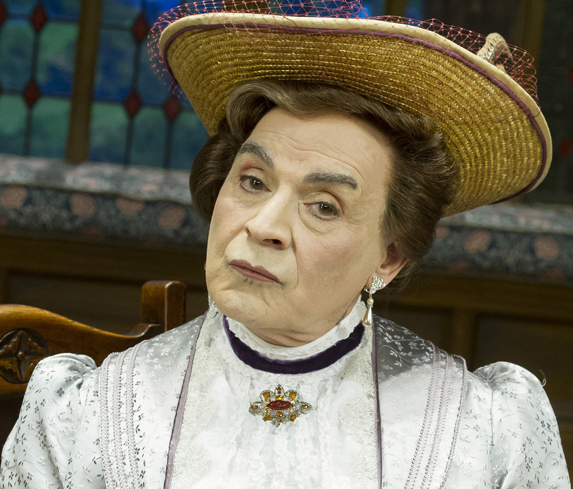The Importance of Being Earnest (Vaudeville Theatre)
David Suchet’s Lady Bracknell struggles to raise laughs in Adrian Noble’s revival

© Alastair Muir
Any revival of Oscar Wilde‘s "trivial comedy for serious people" – the most perfectly written subversive confection in our modern stage history – seems still to be shackled to the looming spectre of Edith Evans as a fearsome Lady Bracknell in the 1952 Anthony Asquith film.
But whereas the best recent Lady Bs – Judi Dench at the National, Maggie Smith in the West End – have sounded new notes of vulnerability, girlishness, even sensuality – in the old trout, David Suchet, gussied up in layers of purple and a ten-galleon hat, comes on like a posh drag act in a suburban rep, drops anchor centre stage, and offers a ferociously unfeminine display of squawks, squeaks and basilisk stares of critical inhumanity.
It’s a noisy and resolutely unfunny performance discharged with this great actor’s ironclad technique. "Found?" is an explosion; "handbag?" lost in a fit of the choking giggles; "cloakroom at Victoria Station" a stab in the stomach; "the Brighton line" a cue for recovery on the climactic, clinching, "the line is immaterial."
All very well. But the stage-hogging and face-pulling – he shrivels his features into a snout-like moue of disapproval at the slightest excuse – is ridiculous. And can someone please tell Suchet and his director, Adrian Noble, that the old clown gag of heaping six spoonfuls of sugar into one’s cup of tea is neither plausible nor appropriate in a comedy of good manners and bad karma.
One presumes that Suchet’s motive is the example of Geoffrey Rush and Brian Bedford (not to mention Gyles Brandreth and Bette Bourne) in the part, though I doubt if either of those fine actors came close to Jonathan Hyde’s brilliant channelling of Martita Hunt at the Glasgow Citizens in a performance, too, that made it quite clear that Gwendolen would indeed become her own mother in about a hundred years’ time.
That production also had a "male" Miss Prism which made a lot of sense. Here, Michelle Dotrice carries on like Margaret Rutherford on speed, shamelessly grotesque in her sudden hot flushes for Richard O’Callaghan’s oleaginous Canon Chasuble. Prism forbids Cecily, in her study of the political economy, to touch on the chapter concerning fall of the rupee — far too sensational; just as the missing baby might have been the victim of a revolutionary outrage…
Who’d have thought that chaos in Greece and Tunisia could come so close? But it’s always the fate of great plays to glint and glimmer in the present. And at least Noble has preserved the perfect three-act structure with two intervals, and presented (with designer Peter McKintosh) Algy’s Half Moon flat as an airily cream-coloured tribute to the arts and crafts movement, with inset panels of Edward Burne-Jones paintings of glittering grey angels and drapes.
The second act garden at Jack’s Hertfordshire retreat is more conventionally designed, and the play – released from the pressure of Suchet – finds its rhythm in the exchanges between Emily Barber’s Gwendolen and Imogen Doel’s superb, and superbly funny, Cecily, a bright-eyed little schemer who has been writing her lover’s letters to her on his behalf for some time now.
Jack (Michael Benz) and Algy (Philip Cumbus) are each in earnest about being Ernest. Their confused identities are part of the secret life of "Bunburying," Wilde’s brilliant device for making a metaphor of an alternative lifestyle and a mockery of social conventions. It’s all done with such lightness and charm and that begins to come through the second act quadrille of the lovers. But Suchet roars back on in the drawing room, where a volume of military genealogy untangles the truth and leaves him predatorily, but not movingly, alone, winking at the audience.












